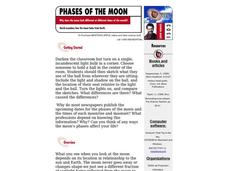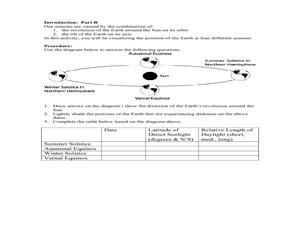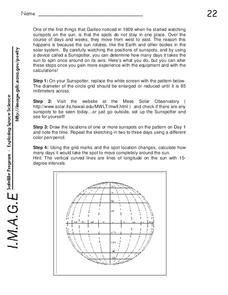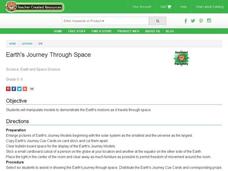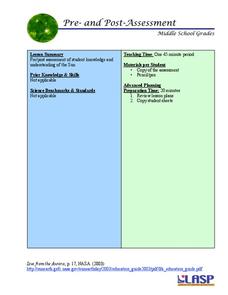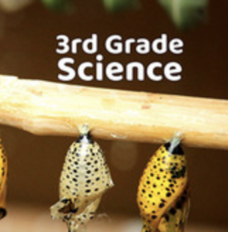Curated OER
Earth's Place in Space
In this Earth instructional activity, students review how the revolution, rotation, and tilt of the Earth effects the Earth. This instructional activity has 4 matching and 3 short answer questions.
Curated OER
The Solar System: Go Green with the Sun!
Third graders learn how to use solar power. In this sun, technology and energy lesson, 3rd graders learn how the solar power from the sun can give off energy, learn about solar panels, discuss their uses and benefits, and design a...
Curated OER
Phases of the Moon
Students explore why when you examine the moon depends on its location in relationship to the sun and Earth. The moon never goes away or changes shape-we just see a different fraction of sunlight being reflected from the moon to Earth.
Curated OER
The Four Seasons - Earth's Axis
Learners explain that it is the tilt of earth's axis that causes the seasons. They engage in a variety of activities, both teacher-led and on the computer, which enable them to further explain how the Earth's axis affects the seasons.
Curated OER
The Earth in Space
Students use computer images to explain why the Earth has seasons and examine the phases of the moon. They create 3-D images and present them to the class. They answer a series of questions at the end of the lesson.
Curated OER
Suns Path and Seasons
Using a plastic dome to represent the hemisphere of the sky, your class is able to demonstrate the path of the sun at different points of the day and year. They use a protractor to record movement and answer questions about...
Curated OER
The Four Seasons - Earth's Axis
Students discover that it is the tilt of the earth's axis that results in the seasons. They clarify common misconceptions about the earth's orbit around the sun.
Lake Afton Public Observatory
Shadows, Angles, and the Seasons
Shine some light on the topic of seasonal change with this collection of activities. Whether it's by measuring the change in the length of their shadows, or modeling the earth's orbit around the sun using a lamp and a globe, these...
Curated OER
Sunspots and the Sun's Rotation
In this sun worksheet, students use a Sunspotter to observe the rotation of the sun by identifying the presence of sunspots and watching them rotate over time. Students calculate how many days it takes to see the sunspots they observe in...
Curated OER
How Big Are Earth, Sun, and Moon?
Third graders draw what they believe is in space on a dry erase board. In groups, they are given a beaker half filled with water and they add a teaspoon of oil, observing the different layers that form. To end the lesson, they identify...
Curated OER
Adding the Moon: Using a Classroom Model to Explore the Movement of the Sun, Earth, and Moon
Students observe and discuss motions of the Earth and the Moon as they spin and orbit the Sun.
Curated OER
The Earth is Tilted, What Does that Mean?
Students examine the tilt in the Earth's revolution around the sun. Using that information, they draw a picture and label the indirect and direct rays of the sun. In groups, they answer discussion questions and complete an assessment...
Curated OER
Earth's Journey Through Space
Learners arrange various pictures of the Earth to identify its journey through space. In this Earth's rotation instructional activity, students use models of the Earth and demonstrate its journey through space. Learners complete the...
PHET
The Sun: Pre- and Post-Assessment
Want to see how far pupils have come since the beginning of the unit? This activity is designed to be a pre- and post-assessment for a unit on the Sun. The first in a series of 18 that can be combined to form a complete unit. Two...
Utah Education Network (UEN)
Utah Open Textbook: 3rd Grade Science
How do we interact with Earth? Scholars learn about the sun, Earth, moon, forces, gravity, and heat sources by reading a text and performing hands-on demonstrations. They also differentiate between living and non-living things using...
Curated OER
The Earth-Sun-Moon System
Third graders construct a model of the earth-sun-moon system using students as the sun, moon, and earth. They discuss ways that time is related to the movement of the earth and moon.
Purdue University
Global Design for the Seasons
People don't all get the same amount of sun at the same time of the year. Collaborative groups explore how the motion of Earth contributes to the idea in an inquiry-based STEM lesson. Learners first investigate how the rotation of Earth...
Curated OER
Tilted Earth
What causes Earth's seasons? Find out through a series of anticipatory questions, an easy yet powerful activity representing the sun-Earth system, a diagram to label, and follow-up questions. Dispel the misconceptions about Earth being...
Curated OER
Bill Nye Video: Earth's Seasons
For this earth's seasons worksheet, students answer fill in the blank questions after seeing Bill Nye's video. Topics include the rotation of the earth around the sun, the tilt of the earth, the time zones and sunlight.
Curated OER
Sun Shadow Cycles
High schoolers use diagrams to review how the Earth rotates around the sun. In groups, they use the same diagrams to explain how the sun shadows are produced and how they differ between seasons. They describe the Earth's rotation and...
Curated OER
Wobbling in Circles
Sixth graders role play the parts of the sun, the moon and the Earth as they simulate the concepts of revolution and rotation. They act out the parts in small groups and discuss the concepts as a class.
Science 4 Inquiry
Phases of the Moon
The moon takes just over 27 days to orbit around Earth. Young scientists position themselves as the earth as they rotate around the sun and hold the moon. This allows them to observe the patterns and phases of the moon.
Core Knowledge Foundation
A Time for All Seasons - Summer
The sun is shining and the birds are singing, what better time to teach young learners about the fun season of summer. In this week-long science series, children learn how the rotation and orbit of the earth influence...
Core Knowledge Foundation
A Time for All Seasons - Fall
The weather is cooling down and the leaves are starting to change color; fall is right around the corner. Celebrate this special time of year with this earth and life science lesson series that teaches children about the...




